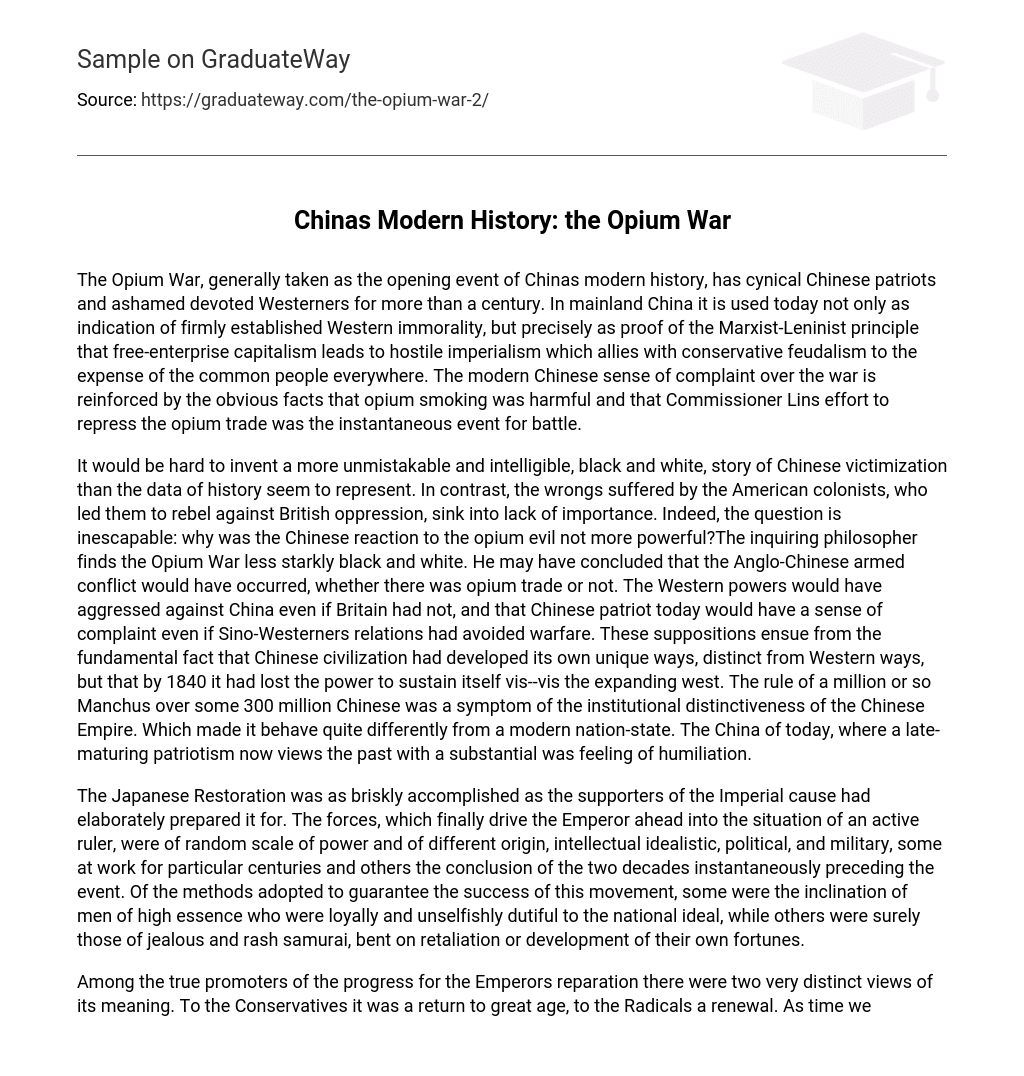The Opium War, generally taken as the opening event of Chinas modern history, has cynical Chinese patriots and ashamed devoted Westerners for more than a century. In mainland China it is used today not only as indication of firmly established Western immorality, but precisely as proof of the Marxist-Leninist principle that free-enterprise capitalism leads to hostile imperialism which allies with conservative feudalism to the expense of the common people everywhere. The modern Chinese sense of complaint over the war is reinforced by the obvious facts that opium smoking was harmful and that Commissioner Lins effort to repress the opium trade was the instantaneous event for battle.
It would be hard to invent a more unmistakable and intelligible, black and white, story of Chinese victimization than the data of history seem to represent. In contrast, the wrongs suffered by the American colonists, who led them to rebel against British oppression, sink into lack of importance. Indeed, the question is inescapable: why was the Chinese reaction to the opium evil not more powerful?The inquiring philosopher finds the Opium War less starkly black and white. He may have concluded that the Anglo-Chinese armed conflict would have occurred, whether there was opium trade or not. The Western powers would have aggressed against China even if Britain had not, and that Chinese patriot today would have a sense of complaint even if Sino-Westerners relations had avoided warfare. These suppositions ensue from the fundamental fact that Chinese civilization had developed its own unique ways, distinct from Western ways, but that by 1840 it had lost the power to sustain itself vis–vis the expanding west. The rule of a million or so Manchus over some 300 million Chinese was a symptom of the institutional distinctiveness of the Chinese Empire. Which made it behave quite differently from a modern nation-state. The China of today, where a late-maturing patriotism now views the past with a substantial was feeling of humiliation.
The Japanese Restoration was as briskly accomplished as the supporters of the Imperial cause had elaborately prepared it for. The forces, which finally drive the Emperor ahead into the situation of an active ruler, were of random scale of power and of different origin, intellectual idealistic, political, and military, some at work for particular centuries and others the conclusion of the two decades instantaneously preceding the event. Of the methods adopted to guarantee the success of this movement, some were the inclination of men of high essence who were loyally and unselfishly dutiful to the national ideal, while others were surely those of jealous and rash samurai, bent on retaliation or development of their own fortunes.
Among the true promoters of the progress for the Emperors reparation there were two very distinct views of its meaning. To the Conservatives it was a return to great age, to the Radicals a renewal. As time went on and the exigencies of change began to exercise their intrinsic force, it became evident that the more cautious directors of the movement could no longer craze it upon the pattern of great age. To set up in the middle of the nineteenth century for the government, was an unattainable task, and finally the views of the more radical reformers prevailed. At once it came clear that nothing short of a complete renovation of the Government of Japan would meet the changed state of affairs of the times. The way was opened for the beginning of those exceptional reforms at which the world, frequently uneducated of their true importance, has never ceased to amaze.
History Essays





